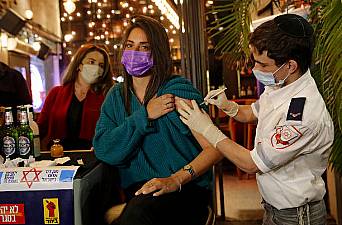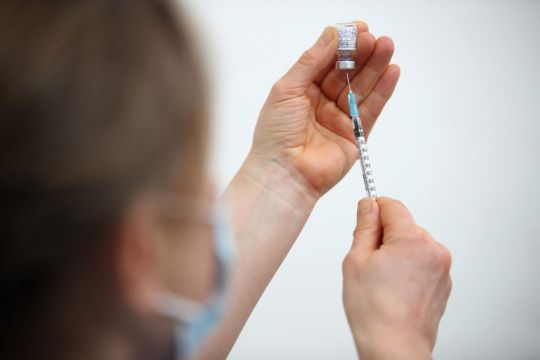The Covid-19 vaccines being used in the UK could reduce a person’s risk of being admitted to hospital by as much as 94 per cent four weeks after the first dose, new data suggests.
Four weeks after receiving the initial dose, the Oxford University-AstraZeneca jab appeared to reduce a person’s risk of hospital admission by up to 94 per cent, according to new research from Scotland.
People who received the Pfizer-BioNTech jab had a reduction in risk of up to 85 per cent between 28 and 34 days after the first dose.
Data for the two jabs combined showed that among people over the age of 80 – who are at high risk of severe disease – the reduction in risk of hospital admission was 81 per cent four weeks after the first dose.
The majority of older people in the study – who are among those at highest risk of severe disease and death from Covid-19 – were more likely to have had the AstraZeneca jab.
Experts examined Covid-19 hospital admissions in Scotland among people who have had their first jab and compared them to those who had not yet received a vaccine.
Scientists from the universities of Edinburgh, Strathclyde, Aberdeen, Glasgow and St Andrews and Public Health Scotland (PHS) looked at data on people who had received either the Pfizer/BioNTech jab or the one developed by scientists at the University of Oxford with AstraZeneca.
Scientists said the evidence showed the vaccines were “performing incredibly well” and that they would anticipate seeing similar results around the UK.
But they said that the study did not set out to examine the differences between the two jabs, and stressed that a comparison would not be “fair” because the vaccines had been offered to different populations.
Lead researcher Prof Aziz Sheikh, director of the University of Edinburgh’s Usher Institute, said: “These results are very encouraging and have given us great reasons to be optimistic for the future.
“We now have national evidence – across an entire country – that vaccination provides protection against Covid-19 hospitalisations.”
He added: “We are overall very, very impressed with both these vaccines.
“When we move beyond trial circumstances you never know what the results are going to be, but this is out in the field and both are performing incredibly well.”
He said that AstraZeneca had “predominantly” been given to the elderly, adding: “At the moment, we don’t have the numbers to do these age-stratified analyses by different vaccine types but we will have those soon.
“But both of these [vaccines] are working spectacularly well, that said, we haven’t done a direct comparison between the two at the moment.”
The researchers examined data between December 8th and February 15th. During this period, 1.14 million vaccines were administered in Scotland – 21 per cent of the Scottish population.
The Pfizer vaccine has been received by some 650,000 people, while 490,000 have had the Oxford/AstraZeneca vaccine.
Researchers looked at GP records on vaccination, hospital admissions, death registrations and laboratory test results – and compared the outcomes of those who had received their first jab with those who had not.

The data has been published as a pre-print.
This means that it is early work that has not yet been through peer-review and has not yet been published in a journal.







